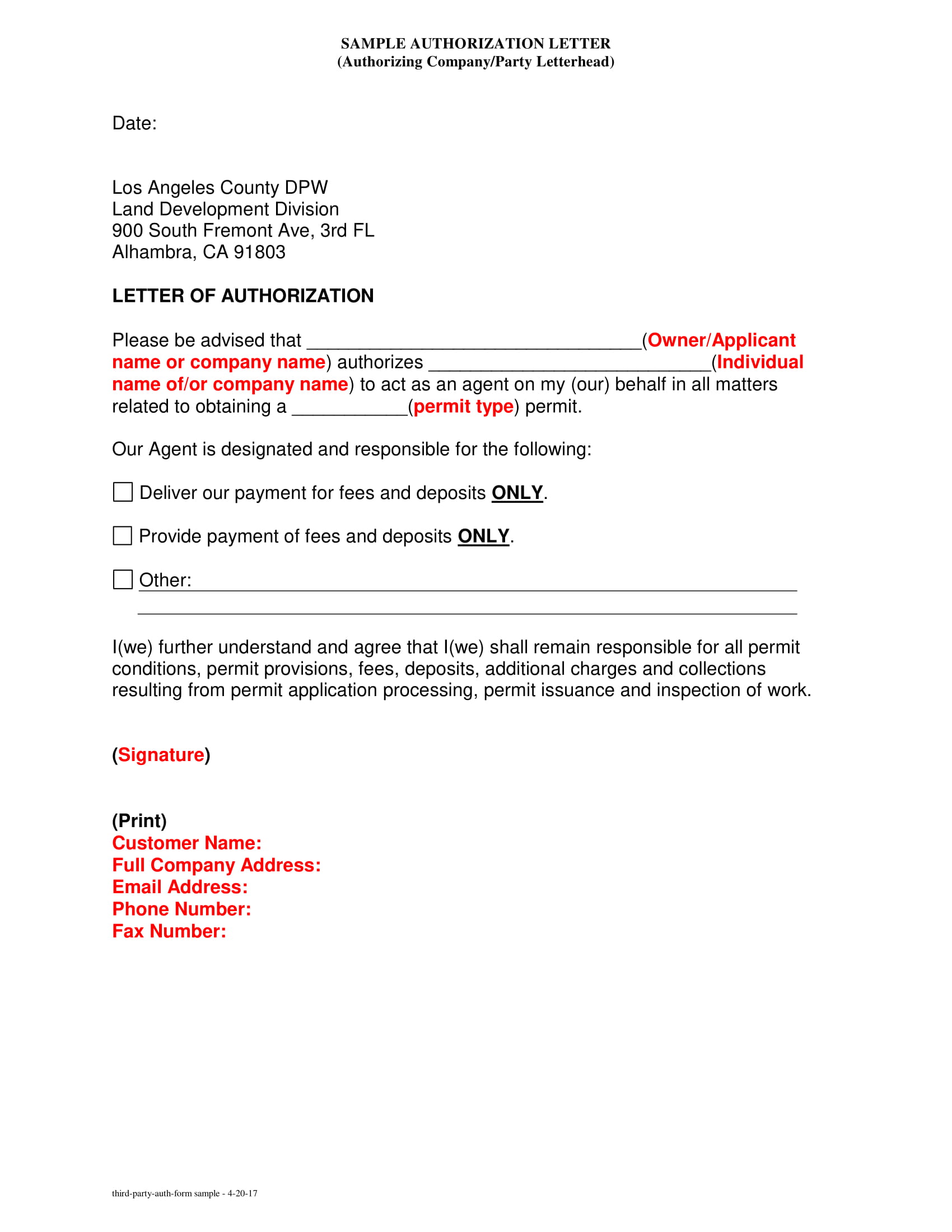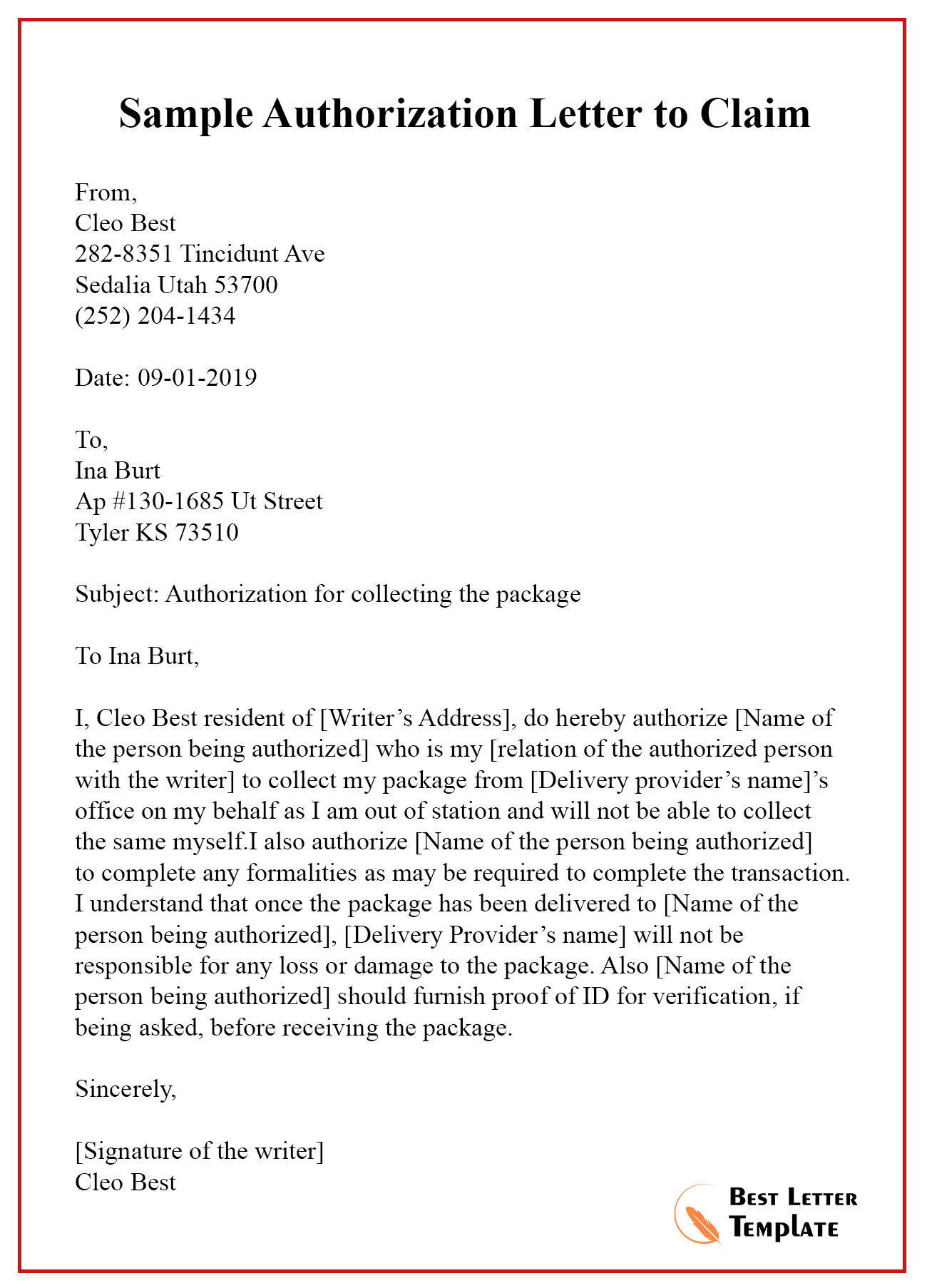Have you ever found yourself in a situation where you needed to authorize someone to act on your behalf? Perhaps you were away on a business trip and needed a trusted colleague to handle important correspondence, or you were unable to attend a crucial legal proceeding and needed someone to represent your interests. In these instances, an authorization letter becomes a vital tool, empowering another individual to act on your behalf with clear and documented authority. This article delves into the world of authorization letters, providing you with a comprehensive understanding of what they are, why they are crucial, and how to effectively craft one to suit your specific needs.

Image: www.examples.com
An authorization letter is a formal document that gives someone the legal right to act on your behalf in a specific situation. It’s essentially a written permission slip that grants another person the authority to perform certain actions or to make decisions on your behalf. These letters are commonly used in a variety of contexts, ranging from simple errands like collecting a package to more complex situations like managing your finances or legal disputes. While seemingly straightforward, drafting an effective authorization letter requires careful consideration to ensure clarity, specificity, and legal validity.
Understanding the Essence of Authorization Letters
The foundation of any authorization letter lies in its core purpose: to grant another person the authority to act on your behalf in a specific context. These letters are essentially legal documents that define the scope of the delegated authority, providing a clear framework for the authorized individual to operate within. Before diving into the specifics of drafting an authorization letter, it’s essential to grasp the key principles that underpin its effectiveness.
Specificity and Clarity: One of the paramount aspects of an effective authorization letter is its specificity. It should explicitly detail the exact actions or decisions the authorized individual is permitted to make. Avoid ambiguity or overly broad statements; instead, use precise language to define the scope of their authority. For example, if you’re authorizing someone to collect a package, clearly state the details of the package, the courier service, and the location of pickup.
Time Constraints: Authorization letters often have time limitations. It’s crucial to specify the duration for which the granted authority is valid. This can be a specific time period, like “for a period of one month,” or it can be tied to a certain event, like “until the matter is resolved.” By clearly defining the time constraints, you ensure that the authorization remains valid and relevant for the intended purpose.
Revocation of Authority: It’s essential to include a clause explaining how the granted authority can be revoked. This demonstrates that you retain ultimate control over the authorization and can rescind it at any point if necessary. This clause typically states that you can revoke the authorization by providing written notice to the authorized individual.
Crafting an Effective Authorization Letter: A Step-by-Step Guide
Now that we’ve established the fundamental principles of authorization letters, let’s delve into the practical steps of drafting one that serves your needs. Creating a clear and legally sound authorization letter involves several key components:
1. Header and Salutation: Begin by clearly stating the date and your contact information. Then, use a formal salutation like “To Whom It May Concern,” or address the recipient by name if you know it.
2. Introduction: Briefly state the purpose of the letter. Indicate that you are authorizing another individual to act on your behalf.
3. Authorization Details: This section constitutes the heart of your authorization letter. Clearly define the specific actions or decisions the authorized individual is empowered to undertake. Use precise language and avoid ambiguity. Specify any relevant details, such as dates, locations, names, or specific documents.
4. Duration of Authority: Define the time period for which the granted authority is valid. You can specify a specific date or duration, or tie it to a particular event.
5. Revoking Authority: Include a clause explaining how you can revoke the authorization. This can be through a written notice or a specified procedure.
6. Signature and Witness: You must sign the authorization letter to make it legally valid. In some cases, it may be necessary to have a witness sign the letter as well.
7. Example:
[Your Name]
[Your Address]
[Your Phone Number]
[Your Email Address]
[Date]
To Whom It May Concern:
This letter serves as authorization for [Name of authorized individual] to claim [Specific item or claim, such as a package, a refund, or a legal settlement] on my behalf.
[Name of authorized individual] is authorized to collect and receive [Specific item or claim] from [Name of entity or individual] at [Location] on [Date].
This authorization is valid for a period of [Duration of authority]. I reserve the right to revoke this authorization at any time by providing written notice to [Name of authorized individual].
Sincerely,
[Your Signature]
[Your Typed Name]
Witness:
[Witness’s Signature]
[Witness’s Typed Name]
Beyond the Basics: Considerations for Specific Needs
While the general framework of an authorization letter remains consistent, certain situations may necessitate specific adaptations. Here are some key points to consider when crafting authorization letters for specific purposes:
Legal Matters: When authorizing someone to act on your behalf in a legal context, it’s crucial to consult with an attorney. They can advise on the necessary legal language, ensuring that your authorization is legally valid and protects your interests.
Financial Transactions: If you’re authorizing someone to handle your finances, you’ll need to be particularly careful. Clearly specify the scope of their financial authority, the amount they’re authorized to handle, and any relevant time constraints. It might be advisable to include specific instructions for documentation and reporting requirements.
Medical or Healthcare: When authorizing someone to make medical decisions on your behalf, it’s critical to follow the legal guidelines and procedures specific to your jurisdiction. Consider using a durable power of attorney for healthcare, which grants someone the legal authority to make healthcare decisions on your behalf.
Business and Commercial Transactions: Authorization letters in a business context are often used for transactions, negotiations, or legal proceedings. Be specific about the scope of the authorized individual’s authority and make sure the person is aware of the potential risks and liabilities involved.

Image: noellawee.blogspot.com
Example Of Authorization Letter To Claim
The Power of Empowerment: Giving the Right Authority
The act of granting authority through an authorization letter is a powerful one. It empowers another individual to act on your behalf, relieving you of burdens and ensuring that your needs are met. By understanding the principles of authorization letters, carefully crafting them to suit your specific needs, and consulting with professionals when necessary, you can harness the power of this essential legal tool to achieve your goals and manage your own affairs with confidence.






